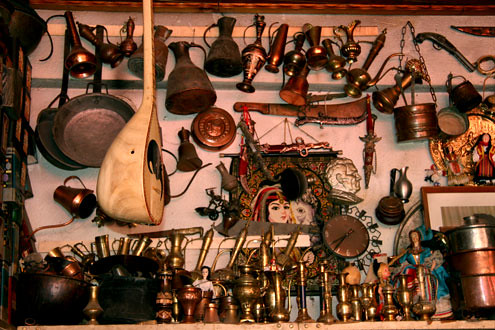
The goods for sale one such shop include brass lamps and ornaments, copper Turkish coffee utensils, clocks, knives, medallions and a mandolin. Photo by Christian Kallen
Случајно на интернет налетав на оваа фото сесија од посетата на Ричард Бенкс на Македонија, во постот представувам дел од фото сесијата – ако сакате целосно да ја видите одете на овој линк. Повеќе »..... more ».....
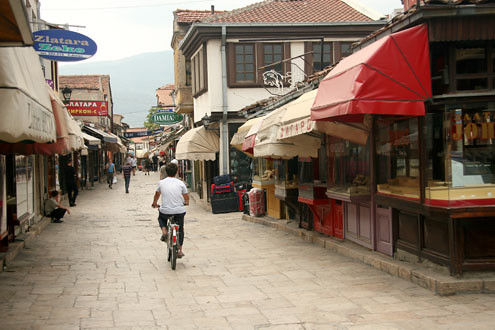
The old quarter dates back more than 1,000 years, and despite earthquakes and armed conflict over the years still boasts a plethora of craftsman’s shops and cafes from many eras. Photo by Christian Kallen
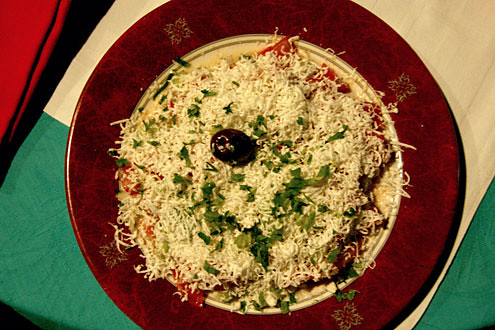
Macedonia’s favorite salad, at least during summer, is sopska, a mélange of fresh tomatoes, cucumbers and grated goat cheese, usually with an olive on top. Photo by Christian Kallen

The Stone Bridge over the Varda River in Skopje is at least 500 years old, possibly built during the early half of the 15th century, in the location of a bridge built by the Romans in 518 A.D. Though it has been damaged several times over the centuries by warfare, it survived relatively unscathed the 1963 earthquake that otherwise almost leveled the city. Photo by Christian Kallen

The Movrovo countryside, an area known as Mount Bistra, is fertile browsing ground for goats, sheep and cattle, and a prime producer of Macedonia’s cheeses. Photo by Christian Kallen
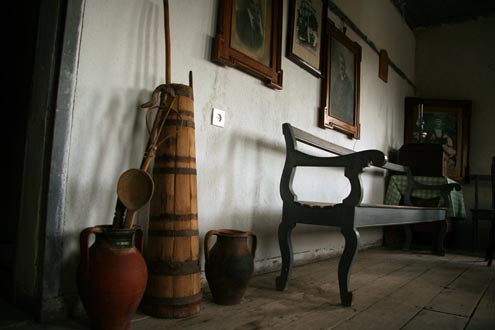
The traditional houses of Galichnik feature a common room on the second floor, where guests are greeted and offered rakija and something to eat. This room belonged to Nora’s grandmother, and the antique look of its furnishings caught the photographer’s eye. The house remains in the family, though it is seldom used. Photo by Christian Kallen

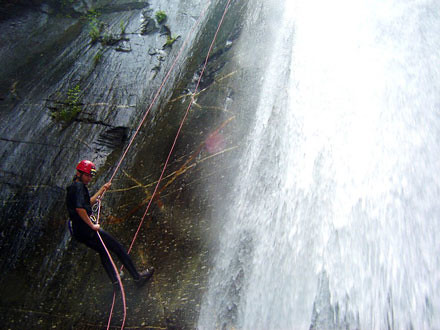
Outside of Strumika, in the southeast corner of Macedonia, Smolar Falls are over 90 feet high, one of the tallest continuous waterfalls in the country. Climbers such as Nikola Angelov enjoy the “rush” of abseiling down the slick spill. Photo by John Cannin
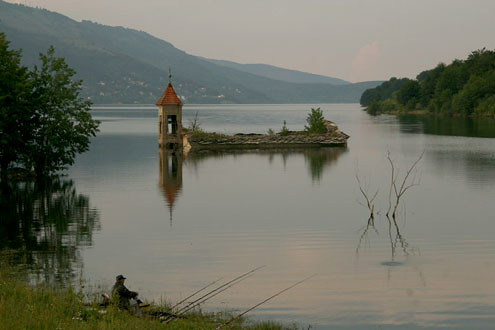
Another way to heal is to go fishing. Here, a fisherman sets up on the banks of the Mavrovo Lake near Mavrovo National Park, the nation’s largest protected area. The lake is artificial, and the old town chapel that was drowned by its rising still shows the roofline above the waters. Photo by Christian Kallen
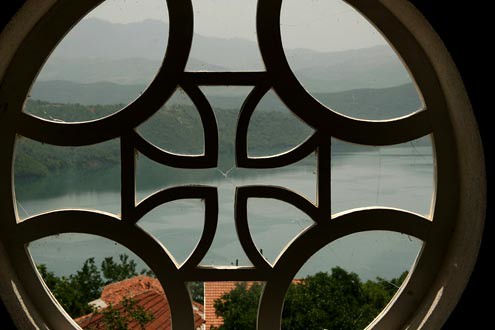
In the steeple, a rounded Maltese cross frames the waters of nearby Lake Debar. The convent and monastery seem far from modern life, but somehow still linked to it. Photo by Christian Kallen
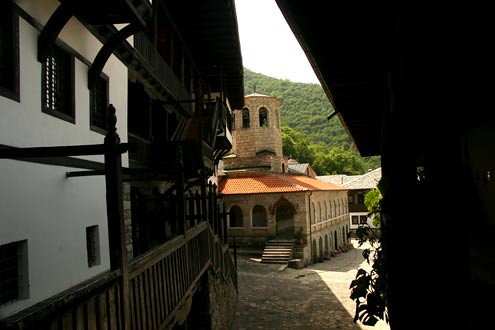
Monks at the Bigorski monastery live in this 18th century building, just steps from the orange-roofed chapel.
Photo by Christian Kallen
Photo by Christian Kallen
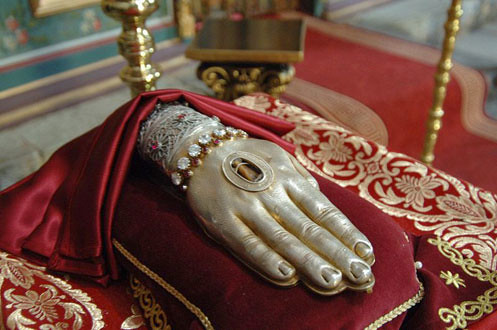 rch dedicated to St. George, at Raychani, a tiny bone is surrounded by an elaborate setting representing the hand of John the Baptist. Such relics are often thought to smell sweetly, and remain in a state of constant preservation despite time and the elements. Raychani’s other relics are said to include slivers of the cross as well.
rch dedicated to St. George, at Raychani, a tiny bone is surrounded by an elaborate setting representing the hand of John the Baptist. Such relics are often thought to smell sweetly, and remain in a state of constant preservation despite time and the elements. Raychani’s other relics are said to include slivers of the cross as well.Photo by John Canning
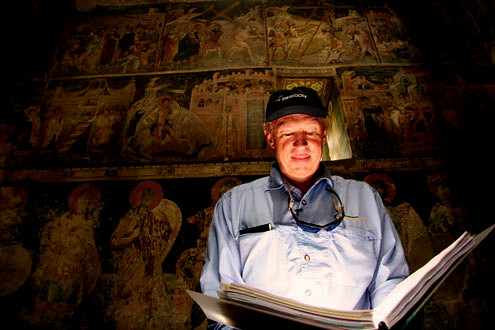
In the Staro Nagoricane church of John the Baptist, near Kokino, Richard Bangs finds inspiration in his book of research on Macedonia, compiled by Richard Bangs Adventures head researcher Julia Romano. The murals of the church are among the most important in Macedonia, pre-figuring the realistic innovations of the Renaissance.
Photo by Christian Kallen
Photo by Christian Kallen
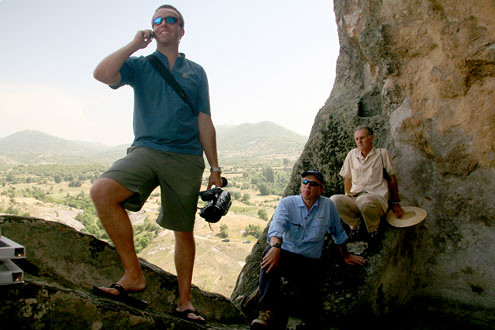
Didrik Johnck takes a break from his videotaping of Richard and Aleksovski at a pre-historic basis to take a cell phone call, demonstrating that no place exists in the past any more: it’s all the present. Photo by Christian Kallen
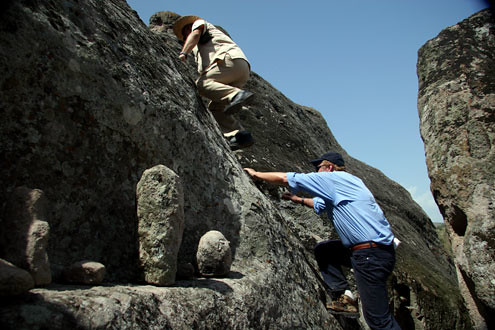
Richard follows Dr. Aleksovksi up the ancient carved steps to the higher reaches of Tsotsev Kamen. Some worked stones have been placed on the shelf in the foreground, but almost every square foot of this rocky knob has felt the tools of man, with hand-holds, footsteps, and basins found everywhere. Photo by Christian Kallen
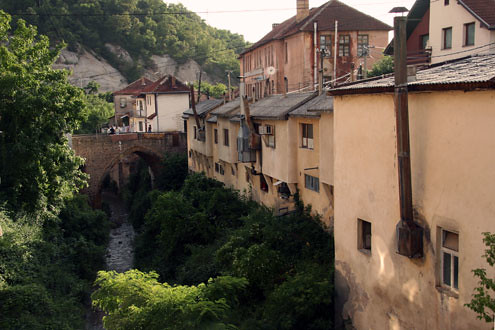
Some relief came when we reached Kratova, itself a pre-historic town built in the crater of an extinct volcano. Aleksovki’s home and research center are located here. Photo by Christian Kallen
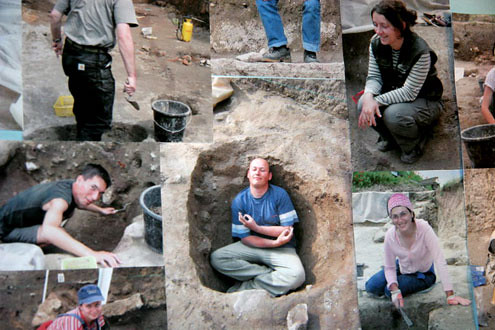
A collage of photographs shows Bilbija’s students in various stages of the dig at Govrlevo. In the center a student mugs the posture of the site’s greatest find, Adam of Macedonia. Photo by Christian Kallen
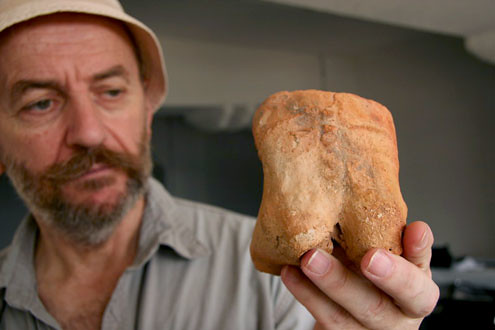
Miloš Bilbija holds what he believes is his most significant find, a small figurine he calls Adam of Macedonia. The spine, ribs, and buttocks are clearly representative of a naturalistic approach to art, in contrast to the female figurines that preceded it. Photo by Christian Kallen
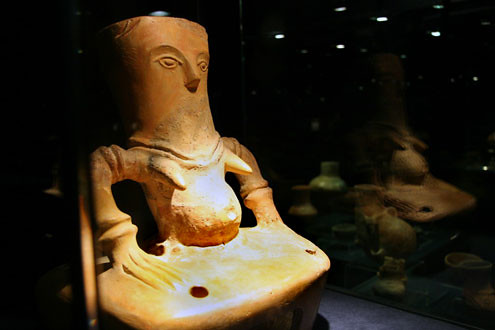
This Neolithic female figurine in the Museum of the City of Skopje is representative of the combined concerns of fertility and sustenance of the early agrarian settlers of Macedonia. The figurine was found by Miloš Bilbija in a dig not far from Skopje. Photo by Christian Kallen
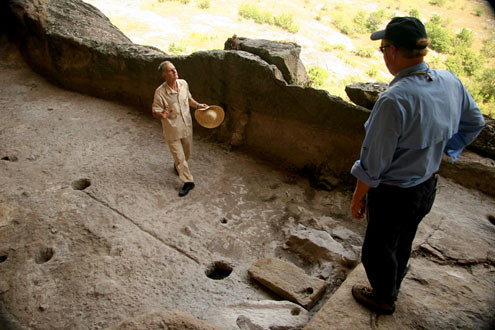
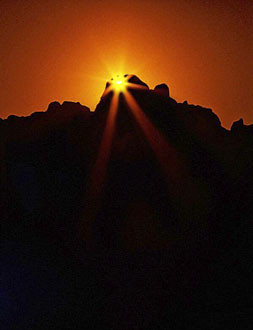
This photo of the sunrise as seen from the throne demonstrates how the notches in the ridge “point” to the exact location of the sun’s appearance on certain days. Photo by Ljupco Ilievski
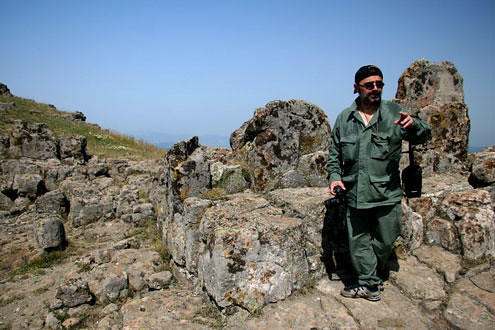
Photographer Ljupco Ilievski of Skopje points out the view from the “throne,” where priests are thought to have sat to observe the cyclical rising of the sun and moon through the notches cut in the mountain’s ridges. Photo by Christian Kallen
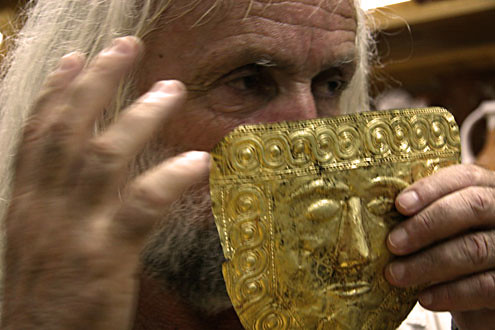
A playful Dr. Kuzman holds the golden mask to his face, to demonstrate its life-size scale. Such masks were used to mark the ashes of cremated royalty, to identify the remains to the denizens of both afterlife and the living. The mask alone is thought to be worth up to $18 million. Photo by Christian Kallen
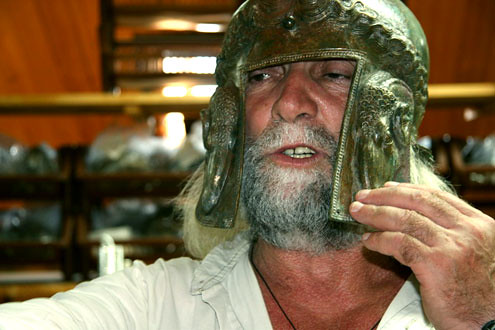
Dr. Kuzman tries on a polished Macedonian helmet from the era of Alexander the Great. The horned sheep on each side was a sign of royalty – a general or king wore this helmet in ceremony or battle. Photo by Christian Kallen

A close-up view of a Roman mosaic shows the small stones cut and placed to create the image. The closer you look the less visible the image is; moving farther away reveals the face. Photo by Christian Kallen
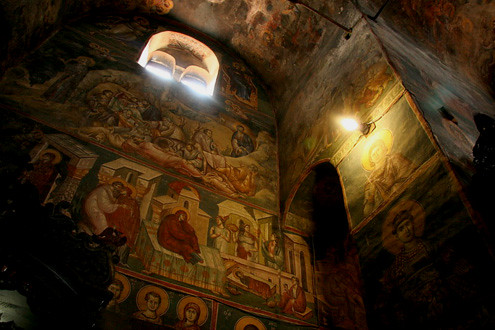
1 comment:
Як новачок, я завжди інтерактивний пошук статей, що може мені допомогти. Спасибі Wow! Спасибі! Я завжди хотів писати на моєму сайті щось подібне. Чи можу я взяти участь у ваш пост в блог?
Post a Comment